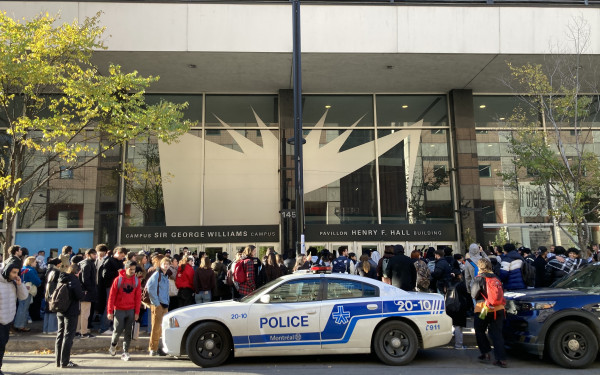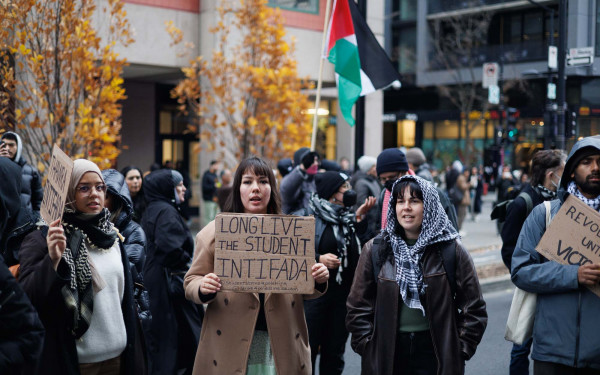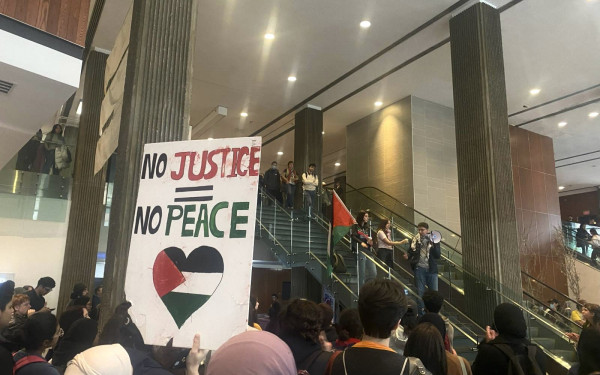Will Concordia give in to the pro-Israel lobby?
Why the IHRA definition of antisemitism is inherently wrong and incredibly dangerous
This article was written by Jacob Wade-Vallance on behalf of IJV Concordia.
The Palestinian liberation movement is constantly under threat by various forces, whether it is by police violence at peaceful protests, by our universities cancelling events or by politicians who falsely portray the movement.
These forces of suppression work against our cause, and ignore the demands of thousands who take to the streets in various cities across the world, all calling for an end to genocide and apartheid perpetuated by the state of Israel. Yet, the latest and most threatening concern is the adoption of the International Holocaust Remembrance Alliances (IHRA) definition of antisemitism. This is in addition to a series of hearings that falsely represent the movement for Palestinian liberation, which many Jews, such as myself and Independent Jewish Voices (IJV) Concordia, are proudly a part of.
The House of Commons Standing Committee on Justice and Human Rights (JUST) holds parliamentary hearings on differing topics and issues relating to human rights and prejudice directed towards marginalized communities. On May 27, JUST led a committee entitled “Antisemitism and Additional Measures that Could be Taken to Address the Valid Fears That Are Being Expressed by Canada’s Jewish Community.”
It is unfortunate that while these hearings could be a place to discuss valid antisemitism, they are instead an attack on Palestinian solidarity and liberation, and a means to reinforce the propaganda of the pro-Israel lobby. Witnesses and speakers at the event include members of the Centre for Israeli Jewish Affairs (CIJA), Hillel, StartUp Nation, as well as B’nai Brith, all organizations that work to perpetuate Zionism and lobby for Israel. CIJA is a pro-Israel lobbying group and works with the Jewish Federation of Montreal (CJA), which funds Hillel Montreal. These groups have repeatedly called for the suppression of the pro-Palestine movement, have constantly denounced our peaceful and just protests, and even called for Palestinian students and activists to be banned from the Concordia campus.
IJV, a Jewish anti-Zionist organization, was excluded from the hearings, and so were any students from Concordia who were critical of the Israeli government. The speakers seem to be selectively chosen to present the narrative that all Jews feel under threat by the rise of the Palestinian movement, when this is not the case. The witnesses and speakers at the committee further misrepresent our community and exclude that Jews are a large part of the movement, portraying the Jewish community as a monolith.
Anthony Housefather serves as a member of the JUST committee and has worked time and time again to suppress Palestinian activism as well as critique it on national news. Housefather even called for police violence upon students, demanding that the peaceful McGill encampment be cleared. Other speakers were from groups such as StartUp Nation that have platformed and posted racist and Islamaphobic rhetoric. IJV Concordia and IJV Canada submitted briefs to the committee detailing concerns with the direction of the JUST committee as well as sharing our experience as anti-Zionist Jews.
At the JUST committee hearing the president of our university, Graham Carr, along with three other university presidents were present in the discussion. All four presidents were asked if they would implement the International Holocaust Remembrance Alliance (IHRA)’s definition of antisemitism, and Carr testified he would consider the implementation.
So, what is the IHRA definition, and why would it have such negative implications for both the Palestinian and Jewish community?
In 2016, the IHRA, a Berlin-based intergovernmental organization, adopted a “Working Definition of Antisemitism.” The definition itself outlines what antisemitism is in vague and inadequate terms. The problematic aspect of the definition emerges in the 11 examples of antisemitism that accompany the IHRA definition. Of the 11, seven point to critiques of Israel as antisemitism.
Zionism is the Jewish nationalist movement to establish a Jewish ethnostate in Palestine, requiring the expulsion of Palestinians from their homeland. This resulted in the displacement of hundreds of thousands of native Palestinians in 1948, fuelling a refugee crisis and leading to the Nakba. Unwinding the conflation between Judaism and Zionism is a mission that like many anti-Zionist Jews have devoted much time and energy to. It is a toxic thought that is deeply embedded in our institutions. The IHRA definition reaffirms this toxicity, painting the Jewish community as a monolith and assuming Jews as supporters of Israel, when in fact, there are many Jews who do not uphold Zionism and many who are questioning it. This makes the IHRA definition dangerous, as Judaism and Zionism are treated as one and the same.
Rebecca Ruth Gould, a writer and professor at the University of London, describes how the definition acts as a form of “foreign policy by proxy, enabling those who wish to censor and suppress open discussion of Israel’s occupation to do so with the halo of legitimacy.” In fact, the definition has been used politically to suppress critique of the state of Israel and Zionism.
As an anti-Zionist Jewish organization, IJV is committed to Palestinian liberation, which means the IHRA definition would label our organization as antisemitic. This is divisive and ethically unacceptable. Implementing this definition would be unreasonable and inaccurate.
The most intensely problematic aspect of the IHRA definition is that it states that describing the state of Israel as a racist endeavour is antisemitic as it denies Jewish people their right to self-determination. Human rights organizations which stand against all forms of racism, including B’tselem, Human Rights Watch and Amnesty International, have all highlighted the state of Israel as a racist endeavour and apartheid state.
Adopting the IHRA definition is not a promise to stop antisemitism. Instead, it is an effort largely constructed and amplified by pro-Israel lobbies to align institutions such as universities or governments with the colonial, genocidal and apartheid ideologies of Israel.
It is absurd that according to the IHRA definition, these organizations would therefore be antisemitic in their views. In fact, even one of the drafters of the definition, Kenneth Stern, is opposed to the definition being weaponized and adopted by public institutions such as universities as it silences critique of Israel and Zionism.
The IHRA definition of antisemitism is not only an inaccurate description of antisemitism, and a distraction from real antisemitism, but also works to oppress Palestinian activism. Specifically, universities that have adopted the IHRA definition have seen events, actions or motions related to Boycott, Divestment and Sanctions (BDS) shut down under the label of antisemitism. BDS is not antisemitic. The BDS movement is an essential tool to fight against Israeli apartheid and the ongoing genocide in Gaza as well as the Canadian government's complicity in this violence. BDS is a Palestinian-led movement which is fully supported by IJV, by anti-Zionist Jews and by many prominent Jewish thinkers and academics.
This spring, Concordia introduced a new task force, Standing Together against Racism and Identity-based Violence (STRIVE). STRIVE consists of six subcommittees, including one on anti-Arab racism and Islamophobia and one on antisemitism.
After the announcement of STRIVE, IJV Concordia emailed the three chairs of the committee to voice our support for the task force, as we have been seeing the rise of the alt-right and a subsequent rise in antisemitism. For example, a real estate fair at the Spanish and Portuguese Synagogue selling internationally-recognized illegal settlements on the occupied West Bank was attended by the alt-right. At an event held and organized by groups that claim to be concerned with antisemitism, one of our members peacefully protesting this act of settler colonialism was harassed, pulled by their hair, dragged on the floor and shoved out of the building onto the cement sidewalk. The harassment and antisemitism in concern is indeed coming from them, as well as the alt-right, not from the movement for a free Palestine.
We constantly face harassment and intimidation from fellow Jews, with the usual tropes of being “self-hating” typically ascribed to us. Even the word “kapo” has made its way into our messages and emails, a slur that refers to Jews who collaborated with the Nazis during the Holocaust. We have seen the rise of anti-Palestinian and anti-Arab racism and Islamophobia, with the Ontario legislature going as far as banning the keffiyeh, as well as ongoing racist stereotypes and a denial of the Nakba.
One must recognize the irony if Concordia were to adopt the IHRA definition, considering that Concordia launched a five-year initiative to decolonize the curriculum and pedagogy of the university. Palestinian liberation is a decolonial act and a form of anti-racism, and with the adoption of the IHRA definition, Palestinian liberation efforts would be suppressed and directly working against Concordia's aim for equity and diversity on campus.
On a campus that promotes equity, diversity and inclusion, adopting the IHRA definition of antisemitism is out of the question. Concordia already offers little in the way of educating students on Palestine and adopting the IHRA definition could put professors and instructors who are incorporating education about Palestine and critiques of Israel into their courses at risk.
The IHRA definition of antisemitism would also threaten prominent student activism at Concordia. IJV Concordia and Solidarity for Palestinian Human Rights Concordia both advocate for a free Palestine from the river to the sea, and the enforcement of the definition would compromise our very important work.
On April 22, 2021, at the annual general assembly of the Concordia University Faculty Association (CUFA), the members passed a motion that articulates a series of critiques of the IHRA definition of antisemitism, showing clearly that faculty rejects the IHRA for Concordia. The members of CUFA passed this motion because of the threat that IHRA represents to academic freedom and anyone teaching or carrying out research on Israel or Palestine. The motion was passed in the context of a national campaign to oppose the IHRA, in which at least 32 faculty associations and unions passed motions. By November 2021, the Canadian Association of University Teachers, representing about 72,000 teachers, librarians, researchers and general staff, also passed a motion opposing the IHRA. Thus, when students and faculty oppose the IHRA definition of antisemitism at Concordia, we do so not as isolated individuals, but as members of a mass movement to protect academic freedom and stand up for Palestine.
Given the dangers of the IHRA definition of antisemitism, it is not surprising that students and faculty have spoken out against it. On May 27, one of our members spoke at a press conference that served as the launch for a new coalition, the Coalition Against Antisemitism, Anti-Palestinian Racism and Islamophobia (CAAARI). CAAARI understands that the only way to end antisemitism, anti-Palestinian racism and Islamophobia is to address them together, not in silos. Our member emphasized how important the distinction is between Zionism and Judaism, and how conflating them is an act of antisemitism in itself. One of the strengths of Judaism, and what makes me so proud to be Jewish, is the diversity of our community. When one conflates anti-Zionism with antisemitism, a vast diaspora of voices are silenced. It also distracts from antisemitism that is of valid concern. Instead, we must advocate for the love of Judaism, and for collective Jewish and Palestinian liberation.
On behalf of IJV Concordia, we would like to offer five recommendations to pass on to the STRIVE subcommittee on antisemitism, Graham Carr and the Concordia administration:
1. Do not isolate antisemitism from other forms of oppression such as anti-Palestinian racism, anti-Arab racism, and Islamophobia
2. Challenge political ideologies that foment racism, hate and fear
3. Create environments that affirm and celebrate all expressions of cultural and religious life
4. Make undoing all forms of racism and bigotry both policy and daily practice
5. Practice safety through solidarity, not law enforcement


_600_832_s.png)




